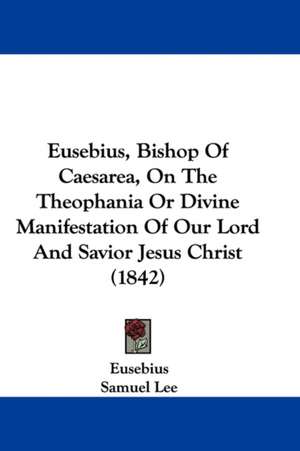Eusebius, Bishop Of Caesarea, On The Theophania Or Divine Manifestation Of Our Lord And Savior Jesus Christ (1842)
Autor Eusebius Editat de Samuel Leees Limba Spaniolă Paperback – 17 iul 2009
Preț: 168.65 lei
Nou
Puncte Express: 253
Preț estimativ în valută:
32.27€ • 34.51$ • 26.91£
32.27€ • 34.51$ • 26.91£
Carte tipărită la comandă
Livrare economică 14-19 aprilie
Preluare comenzi: 021 569.72.76
Specificații
ISBN-13: 9781104745141
ISBN-10: 1104745143
Pagini: 234
Dimensiuni: 152 x 229 x 13 mm
Greutate: 0.35 kg
Editura: Kessinger Publishing
ISBN-10: 1104745143
Pagini: 234
Dimensiuni: 152 x 229 x 13 mm
Greutate: 0.35 kg
Editura: Kessinger Publishing
Notă biografică
Eusebius of Caesarea (260/265 - 339/340 AD), also known as Eusebius Pamphili, was a historian of Christianity, exegete, and Christian polemicist. He became the bishop of Caesarea Maritima about 314 AD. Together with Pamphilus, he was a scholar of the Biblical canon and is regarded as one of the most learned Christians of his time. He wrote Demonstrations of the Gospel, Preparations for the Gospel, and On Discrepancies between the Gospels, studies of the Biblical text. As "Father of Church History" (not to be confused with the title of Church Father), he produced the Ecclesiastical History, On the Life of Pamphilus, the Chronicle and On the Martyrs. He also produced a biographical work on the first Christian Emperor, Constantine the Great, who ruled between 306 and 337 AD. Although Eusebius' works are regarded as giving insight into the history of the early church, he was not without prejudice, especially in regard to the Jews, for while "Eusebius indeed blames the Jews for the crucifixion of Jesus, but he nevertheless also states that forgiveness can be granted even for this sin and that the Jews can receive salvation." Nor can his works be trusted to be from subjectivism, for some scholars believe that "Eusebius is a notoriously unreliable historian, and so anything he reports should be critically scrutinized." This is especially true of his 'Life of Constantine', which he wrote as an eulogy shortly after the emperor's death in 337 A.D, and which is "Often maligned for perceived factual errors, deemed by some so hopelessly flawed that it cannot be the work of Eusebius at all." Yet others see him as a "Constantinian flunky," for as a trusted adviser to Constantine, it was politically expedient for him to present Constantine in the best light as possible.
